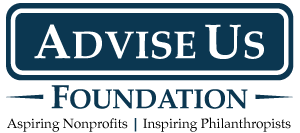
by Andrew Hibel | Dec 1, 2015 | #GivingTuesday, Donor Impact, Donor-Advised Funds |
As founder of The Advise Us Fund, I recognize the power of giving. Since starting this nonprofit organization, I’ve seen firsthand that philanthropy makes our communities stronger by helping those in need and supporting causes that are closest to our hearts. We are all motivated by these passions, and The Advise Us Fund is how I exhibit what’s closest to my heart: philanthropy. Giving Tuesday is an opportunity for us all to be called into action and give back to our communities. We do so by giving to the philanthropic causes that make a difference in our lives. As a founder of a charity that serves other charities and causes, I find it fulfilling to see the act of giving recognized. Without it, no charity would exist. If you are involved in making charities thrive, whether by supporting them, guiding gift-giving clients, or stewarding the organizations, take time today to reflect and give thanks for giving and our culture of giving. TO DONORS who are thinking about your giving, take advantage of our Charity Navigator search feature on our evaluate charities page. Or go directly to Charity Navigator or GuideStar to review the charities you are considering to support. It is worth the time to know more about what you are supporting as there are lots of choices and limited resources. TO FINANCIAL PROFESSIONALS, please know that your role in the philanthropic world is essential. The tools available to donors today are the most sophisticated and complex we have ever seen. Your guidance and stewardship of your client’s giving spirit often provides the spark that makes...

by Andrew Hibel | Sep 18, 2015 | Donor Impact, Donor-Advised Funds, Featured |
Most likely you should start now. Your children or grandchildren, as young as three years old, have started learning to share. Charity is another form of sharing. As Bruce DeBoskey recently pointed out, “Even three-year-olds can be encouraged to select and donate gently used items like clothes, books and toys to children with less. When they assist in delivering these items, they will see how their donations actually help others.” Sharing age-appropriate giving experiences with children or grandchildren is sharing a beautiful and joyful experience with them. You’re teaching them what makes you happy and fulfilled. You’re also leaving them with a legacy of what will make them happy and fulfilled too. As children get older, pre-teen or teen, they increase their capacity for giving and understanding. Their charitable opportunities also increase. Volunteering opportunities can develop greater empathy. Having a greater say in family giving – both choosing charities and choosing amounts – offer an important next step in their development. Pre-teen and teen children can better appreciate what they have through charity. They learn more about what others, not always as fortunate, have too. Through charitable giving teens can develop social skills, business skills and greater capacity for judgment. Consider opening a charitable account with teen children or grandchildren. Charitable accounts like donor-advised funds, supervised by a parent or guardian, offer further opportunities for growth and greater responsibility. As children become adults they may have particular interests in philanthropy. Pursuing charitable interests can develop lifelong connections and skills. They also offer opportunities for family members to connect and share common values. Charitable giving offers happiness, fulfillment and a...

by Andrew Hibel | Aug 27, 2015 | Donor Intent, Donor-Advised Funds, Featured |
Don’t have time now? Do it later. Something came up and you want to give now? Go ahead. Do you have a foundation or a charitable trust and want additional flexibility? You can have it. Donor-advised funds offer donors like you great options! Giving to Your Donor-Advised Fund and Getting More for Charity You can make a gift to your donor-advised fund when it works for you. Make gifts of appreciated assets, employee bonuses, or proceeds from business sales when it’s most convenient and when you want to take a charitable deduction that year. Donor-advised funds help maximize your donations to charity through favorable tax treatment. You can deduct up to 50% of your adjusted gross income (AGI) for cash gifts and up to 30% of AGI for gifts of appreciated securities held at least a year. That means you can have more money to give to the charities you care most about. Making Grant Advisements to Charity Then you can advise grants. Your options? Give to any of more than one million IRS qualified 501(c)3 charities whenever you want. When can you give to charities? Now and in future years. How can you give? You can give now or schedule your charitable donations. Pre-scheduling one-time or recurring donations with a donor-advised fund is easy, popular and a huge opportunity to save your time! Using Donor-Advised Funds Along with Private Foundations and Charitable Trusts Many people have a donor-advised fund as a compliment to their existing foundation or charitable trust. Donor-advised funds also work well with checkbook giving, estate planning and IRA disbursements. Donor-advised funds can offer greater flexibility...

by Andrew Hibel | May 26, 2015 | Donor Impact, Donor Intent, Featured |
Donors give to charity because it “feels good” to give. Usually donors feel good when they believe their contribution “makes a difference.” I know that makes me feel good! But how do you know if your donation makes a difference? There are a number of charity metrics – including defining what success looks like, “on-the-ground” testimonials from those who benefit from donor generosity, and impact reports – that can help donors appreciate how a nonprofit succeeds at its mission. Critically, the process requires organizational management, data collection and analysis, and communicating success with donors. And that costs money. They’re “overhead” costs. Frequently overhead costs come up when assessing charity “worthiness” – and there’s nothing wrong with that. Nonprofit expenses, including overhead, should be in line with good charitable practices. Inflated administrative salaries do not make charity better. But “normal” administrative costs do make nonprofit organizations better. Administrative and development personnel – paid a fair wage – provide critical nonprofit infrastructure. That infrastructure is critical to achieving charitable missions. Charity overhead matters. How should we measure overhead? While we often see overhead listed as a percentage of overall expenses, that alone is a poor measure. Measuring overhead requires context. Start-up and smaller charities may have a higher overhead because of their developmental stage. Some charitable missions may require more administration. For example, organizations with a lot of program staff or volunteers may need more human resources administration. On the flip side, larger charities often have economies of scale that permit them to spend less on overhead. Does that mean that only larger nonprofits can really “make a difference” in their...

by Andrew Hibel | Apr 14, 2015 | Donor-Advised Funds, Featured |
Are you ready for a great opening day? Opening a donor-advised fund is easy, but covering the four bases below means you’ll get the most out of your fund starting from day one. Maximize Contribution Benefits with Your Donor-Advised Fund. Consider giving long-term (held over a year) appreciated securities to your donor-advised fund. This can avoid capital gains tax and maximize your charitable tax deduction. Keep the Right Tax Records – It’s Easy. Gifts to your donor-advised fund may be tax deductible. Those are the records to keep for your taxes. You do not need to keep tax records for grants you advise from your donor-advised funds to charities. You cannot claim donor-advised fund grants on your taxes. Schedule Grant Advisements – It’s Easy. Consider scheduling regular or future one-time charitable gifts. The grant advisement process is easy. You don’t have to remember and take the time to make a gift when you’re busy, like during the holiday season. Your Donor-Advised Fund Can Contribute to Estate Plans. Donor-advised funds offer flexible options for estate planning. Consider advising a grant from your fund to one or more charities that you care most about. Consider leaving the right to make grant advisements from the fund to your heir(s). Consider funding a donor-advised fund for your heir(s) from your estate to leave a legacy of charitable giving. Donor-advised funds make it easy to field a winning team with flexible and tax-efficient charitable giving. Covering the four bases above can make your donor-advised fund experience easier and more fulfilling starting opening day. ____________ Andrew Hibel serves as President and is the Founder of...






